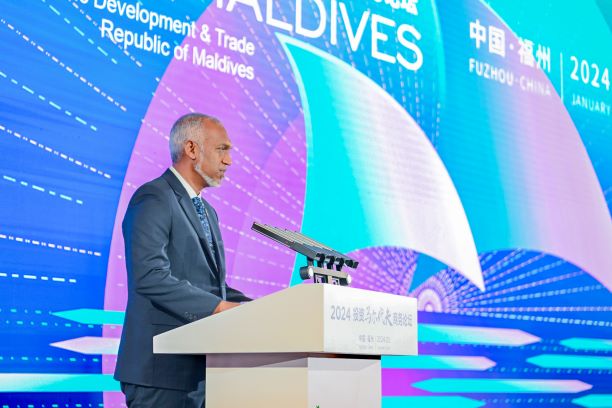President Dr. Mohamed Muizzu has actively sought China’s support for significant infrastructure projects in the Maldives, aligning with the Belt and Road Initiative’s (BRI) objectives. The Maldivian government aims to expand Velana International Airport (VIA) and relocate the commercial port to Thilafushi, in line with the BRI’s goals—an initiative by China since 2013 to boost its global infrastructure development role.
At the Invest Maldives Forum in Fuzhou City, Fujian Province, President Muizzu emphasized the importance of these projects for the Maldives. The second phase of VIA’s expansion is particularly noteworthy, with plans for the international terminal to increase its annual passenger handling capacity from 7 million to an impressive 25 million. This includes improvements to the domestic terminal, a dedicated terminal for budget airlines, a special terminal for private jets, and the development of a Seaplane Terminal at Furanafushi (currently Sheraton Maldives Full Moon Resort). Other additions involve an MRO facility for aircraft repairs, expanding the cargo terminal capacity to 3,000 metric tonnes, and increasing parking capacity for up to 70 aircraft.
China’s commitment to the BRI, reiterated by President Xi Jinping at the 10th-anniversary summit in Beijing, includes substantial investments from the China Development Bank, China Exim Bank, and the Silk Road Fund, totaling over $100 billion. This highlights China’s ongoing strategy to finance major infrastructure projects in participating countries. The Maldives, a BRI participant since President Yameen’s administration, has already experienced successful collaboration with China, such as the construction of the Sinamale bridge, partially funded by China.
However, concerns have been raised about potential debt implications for participating countries. Critics argue that the BRI could lead to a debt trap for economically vulnerable nations, as some countries involved owe substantial amounts to China’s Exim Bank. Some have had to restructure their loans and seek bailout loans, pointing to the financial risks associated with extensive borrowing.
While the collaboration between the Maldives and China under the BRI framework showcases economic and infrastructural benefits, the long-term financial implications of these developments remain a subject of close scrutiny and debate.

